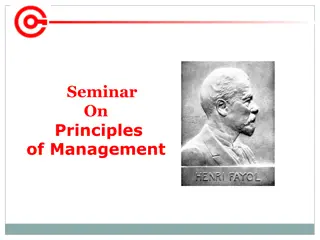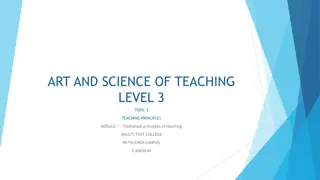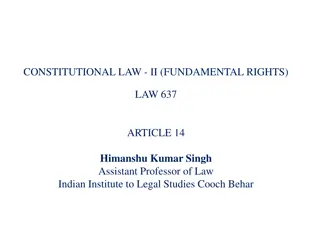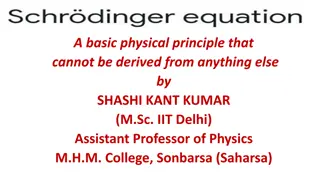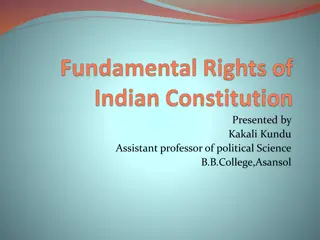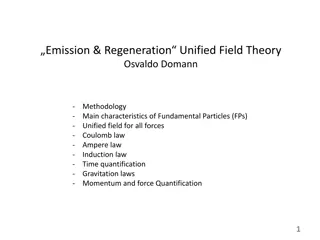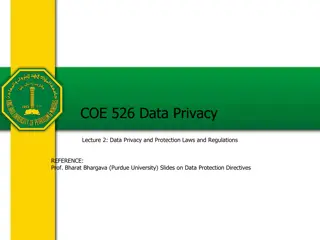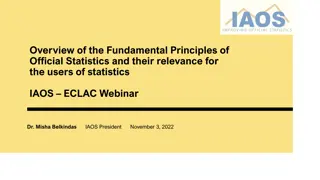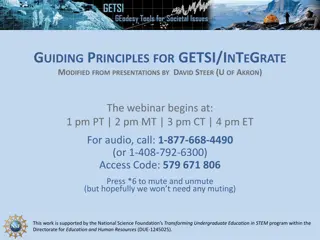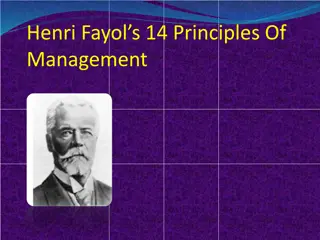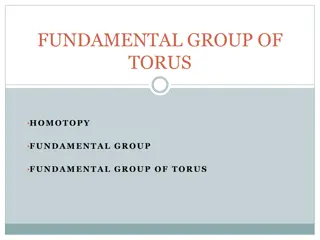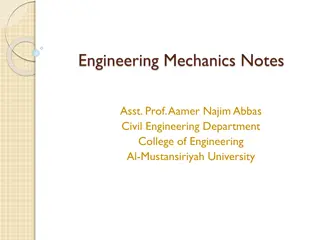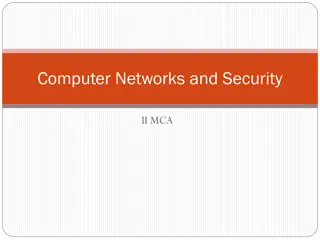ILO Fundamental Principles and Rights at Work
Explore the 5 fundamental principles and rights at work outlined by the ILO, emphasizing social justice and decent work. Delve into how these principles connect with ILO conventions and discuss challenges in their application to Pacific Island Countries.
0 views • 15 slides
Fundamental New Driver Orientation Program
Welcome to the Fundamental family! This program aims to set new drivers up for success by outlining the Fundamental Promise, driver management, and why promises are made to drivers. The orientation covers essential topics such as daily dispatch, risk management, safety, benefits, and more. Meet the
1 views • 61 slides
Principles of the Ghana Civil Service Code of Conduct
The Code of Conduct for the Ghana Civil Service, outlined by Elizabeth Obeng-Yeboah, emphasizes principles such as abiding by the constitution and laws with dignity, integrity, and professionalism. It sets standards for conduct, avoiding conflicts of interest, maintaining political neutrality, and u
1 views • 34 slides
Academic Freedom and Shared Governance in Higher Education
Academic Freedom and Shared Governance are foundational principles advocated by the American Association of University Professors (AAUP) to ensure educators have the freedom to explore, research, teach, and discuss without censorship. These principles empower educators to enhance student learning an
0 views • 9 slides
Essential Principles of Management Discussed in Seminar
Explore the foundational principles of management discussed in a seminar on principles of management. Delve into topics such as division of work, authority, discipline, unity of command, and unity of direction as outlined by Henri Fayol. Gain insights into the importance of these principles for effe
1 views • 22 slides
Principles of Architecture: Unity, Contrast, Mass Composition
Explore the fundamental principles of architecture focusing on unity, contrast, and mass composition. Unity emphasizes harmony among building elements, contrast adds interest without disrupting unity, and mass composition involves arranging shapes in a harmonious way. Proportion and scale play key r
0 views • 24 slides
International Law of War: Nuremberg Principles and Accountability
The Nuremberg Principles, derived from the trials of Nazi officials for war crimes, establish accountability in international law. These principles hold individuals responsible for committing acts considered crimes under international law, regardless of their position or orders received. The assumpt
2 views • 22 slides
Traditional Principles of Teaching and Learning: A Comprehensive Overview
Explore the fundamental concepts and principles in education, encompassing known-to-unknown, simple-to-complex, and concrete-to-abstract ideas. Delve into traditional teaching principles like continuous development, self-activity, socialization, authority and freedom, and perception. Uncover the hol
0 views • 8 slides
Promoting Ethical Principles in Social Science Research
Explore the challenges and strategies for translating and applying ethical principles, especially in emergency contexts. Learn key questions in social science research and how to ensure information contributes to community actions. Understand the importance of considering ethical principles in all w
0 views • 21 slides
Fundamental Right to Equality in Indian Constitution
The concept of equality before the law and equal protection of laws as enshrined in Articles 14 to 18 of the Indian Constitution are essential for ensuring equal status and opportunities for all citizens. Article 14 ensures equality before the law, prohibiting the state from denying any person equal
1 views • 10 slides
Fundamental Physics Principles Explored by Schrodinger and De Broglie
Shashi Kant Kumar dives into the groundwork laid by notable physicists such as Schrodinger and De Broglie, highlighting the fundamental principles of quantum mechanics. The evolution of Schrodinger's equation, the Nobel Prize-winning collaborations, and the application of wave mechanics to atomic st
0 views • 13 slides
Right to Education in the Constitution of Pakistan
The Constitution of the Islamic Republic of Pakistan 1973 mandates free and compulsory education for all children aged five to sixteen. Article 25-A outlines this fundamental right, emphasizing the state's responsibility to provide education in accordance with the law. The link between Article 25-A
3 views • 14 slides
Fundamental Rights in the Indian Constitution
Fundamental rights are crucial for developing an individual's personality and dignity in society. The Indian Constitution grants six fundamental rights, including equality, freedom, and protection against exploitation. Despite certain limitations, these rights are essential for upholding individual
0 views • 10 slides
Unified Field Theory of Fundamental Particles by Osvaldo Domann
Methodology, characteristics, and interactions of Fundamental Particles (FPs) in the Unified Field Theory proposed by Osvaldo Domann are explored. The theory covers the unified field for all forces, quantum laws, momentum quantification, and more. It introduces the concept of Fundamental Particles m
0 views • 21 slides
Study Guide for Principles of Management Course at Africa Research University (ARU)
Welcome to Africa Research University (ARU)! This study guide is designed to help you navigate through the Principles of Management course (Course Code: PRM4) at ARU. It provides an introduction to the course content, emphasizing the importance of developing management skills to effectively lead and
1 views • 40 slides
Data Privacy Laws and Regulations in Saudi Arabia
This content provides an overview of data privacy laws and regulations, focusing on the landscape of data protection laws, examples of comprehensive regulations like FIPPS and GDPR, and sector-specific laws in Saudi Arabia. It includes a homework assignment to explore Fair Information Practices Prin
1 views • 28 slides
Key Principles of Insurance Explained with Visuals
Understanding the principles of insurance is crucial for both insurance seekers and companies. The principles include Utmost Good Faith, Insurable Interest, Indemnity, Contribution, and Subrogation. These principles ensure transparency, fairness, and protection for policyholders. Visual representati
0 views • 6 slides
Prime Numbers and Greatest Common Divisors in Discrete Structures
Cryptography relies on prime numbers and the fundamental theorem of arithmetic to ensure security. We explore the concept of prime numbers, composite numbers, and how to test for primality using trial division. The Fundamental Theorem of Arithmetic establishes that every integer can be uniquely fact
1 views • 44 slides
Principles of Training: Overload, Specificity, and Progression
Principles of training encompass overload, specificity, and progression. Overload requires doing more than usual, specificity involves tailored activities, and progression ensures gradual advancement. These principles are vital for improving fitness levels safely and effectively, emphasizing the nee
8 views • 17 slides
Effective Partnership and Mutual Accountability in Nutrition Clusters
The content discusses the minimum commitments needed for participation in Nutrition Clusters, explains the Principles of Partnership, and explores how these principles can enhance coordination and accountability to affected populations. It emphasizes partner commitments, such as leadership, mainstre
0 views • 7 slides
Fundamental Rights and Directive Principles of State Policy in Indian Constitution
The Indian Constitution guarantees Fundamental Rights such as the right against exploitation, freedom of conscience, and the right of minorities. It also includes Directive Principles of State Policy (DPSP) to guide the government in promoting social welfare. Fundamental Rights and DPSP are meant to
0 views • 6 slides
Overview of Fundamental Principles of Space Law and Outer Space Treaties
The content discusses the fundamental principles of space law highlighted at the United Nations Space Law Conference 2020, focusing on key treaties such as the Outer Space Treaty of 1967 and associated rights, duties, and obligations of states in space exploration and use, including non-appropriatio
1 views • 16 slides
Fraud and Fundamental Dishonesty in Personal Injury Claims
Fraud and fundamental dishonesty continue to be pressing issues in personal injury claims, with an increase in fraudulent activities being observed. This article discusses the rise of fraud, recent reforms in the civil justice system, instances of strike out for abuse of process, the introduction of
0 views • 35 slides
Overview of Directive Principles of State Policy in Indian Constitution
Directive Principles of State Policy (DPSP) in the Indian Constitution encompass social, economic, and political programs aimed at realizing ideals of justice, liberty, equality, and fraternity. They are non-justiciable but guide the state in legislative matters. Classified into Socialistic, Gandhia
0 views • 24 slides
Constitutional Safeguard for the Protection of Women in Indian Law
The Indian Constitution provides equality and empowerment for women through measures of positive discrimination. Gender equality is enshrined in the Preamble, Fundamental Rights, Fundamental Duties, and Directive Principles of the Constitution. Various provisions are designed for the benefit of wome
0 views • 11 slides
Evolution of Fundamental Principles of Official Statistics and Their Global Acceptance
In the late 1980s, the Conference of European Statisticians (CES) initiated discussions to draft the Fundamental Principles of Official Statistics (FPOS) to guide statisticians during transitional periods. Influenced by ethical guidelines, these principles were approved at the UNECE Ministerial leve
0 views • 9 slides
Proposal for Enhancements to the Charter of Fundamental Rights of the European Union
This proposal outlines additions to the Charter of Fundamental Rights of the European Union, focusing on freedom of expression and information, limitations on censorship, and ethical principles for automated systems and decisions. The aim is to ensure the protection of fundamental rights in the digi
0 views • 7 slides
FAIR Principles in Biomedical Research
The FAIR principles - Findable, Accessible, Interoperable, and Reusable - provide a framework for ensuring scientific data in biomedical research is managed and shared effectively. This informative session delves into the theory and practice of FAIR principles, emphasizing the importance of data qua
0 views • 28 slides
The FAIR Principles for Data Management and Stewardship
Embrace the FAIR principles - Findable, Accessible, Interoperable, Re-usable - for effective scientific data management and stewardship. Learn how annotations enhance data FAIRness and the key attributes of each principle. Dive into the high-level guiding principles that ensure data is globally uniq
0 views • 25 slides
Guiding Principles for GETSI/INTEGRATE Webinar – Materials Development and Goals
The webinar presented by David Steer from the University of Akron focuses on guiding principles for material development in the context of GETSI/INTEGRATE modules. It outlines goals for the session, including discussing components of the guiding principles, examples of meeting those principles, and
0 views • 13 slides
Osceola Fundamental High School - Empowering Students for Success
Osceola Fundamental High School, founded in 1981, is a pioneer in fundamental education in Florida. With a focus on back-to-basics structure, student responsibility, and parental involvement, the school promotes values of respect, responsibility, and self-discipline. The Warrior Academy at Osceola o
0 views • 10 slides
Permutations and Combinations in Mathematics
Permutations and combinations are fundamental concepts in mathematics that test logical reasoning and problem-solving skills. This article covers the basics of permutations, combinations, factorial, fundamental counting principles, and example questions to help you grasp these concepts effectively.
0 views • 86 slides
Henri Fayol's 14 Principles of Management
Henri Fayol, the Father of Modern Management, introduced 14 Principles of Management in 1916, outlining essential guidelines for effective management. These principles cover areas such as division of work, authority and responsibility, discipline, unity of command, and unity of direction. By followi
0 views • 19 slides
Principles of Management: Understanding Henri Fayol's 14 Key Principles
Explore the foundational principles of management through the lens of Henri Fayol's 14 key principles, which offer valuable insights into managerial decision-making and organizational interactions. Delve into the history of Henri Fayol, his contributions to management theory, the concept of authorit
0 views • 14 slides
Homotopy and Fundamental Groups in Topology
Explore the concepts of homotopy and fundamental groups in topology, where objects with the same structure can be classified into classes, and the fundamental group characterizes loops. Discover the fundamental group of a torus, its identity elements, closure, associativity, and inverses. Homotopy a
0 views • 10 slides
Child Protection Guiding Principles and Key Issues
Explore the guiding principles and key issues in child protection, including mandatory reporting, confidentiality protocols, and ensuring the best interest of the child. Learn about fundamental principles such as safety, confidentiality, and empowerment, along with key challenges in implementation.
0 views • 30 slides
Engineering Mechanics Basics: Introduction, Concepts, and Laws
Dive into the fundamental concepts of engineering mechanics, covering topics such as space, time, mass, and force. Explore Newton's three fundamental laws and the system of units used in mechanics, including SI and English units. Understand the difference between mass and weight and learn about the
0 views • 9 slides
Traditional Knowledge Guidelines and Principles
Traditional Knowledge (TK) Guidelines and Principles cover important aspects like Free, Prior, and Informed Consent (FPIC), the impact of climate change on Tribal Communities, and the fundamental principles of Tribal Sovereignty over TK. These guidelines emphasize the importance of consent, tribal s
0 views • 17 slides
Legal Principles of Insurance
The legal principles of insurance include indemnity, insurable interest, subrogation, and utmost good faith. These principles ensure fair compensation, financial risk protection, and honesty in insurance contracts. Understanding these principles is crucial for both insurers and policyholders to navi
0 views • 18 slides
Network Security Principles and Techniques
Explore the fundamental concepts of network security, including issues of confidentiality, integrity, and non-repudiability. Learn about the challenges of securing networks and the types of attacks that computer systems face. Dive into basic security techniques like hashing and symmetric key cryptog
0 views • 36 slides




